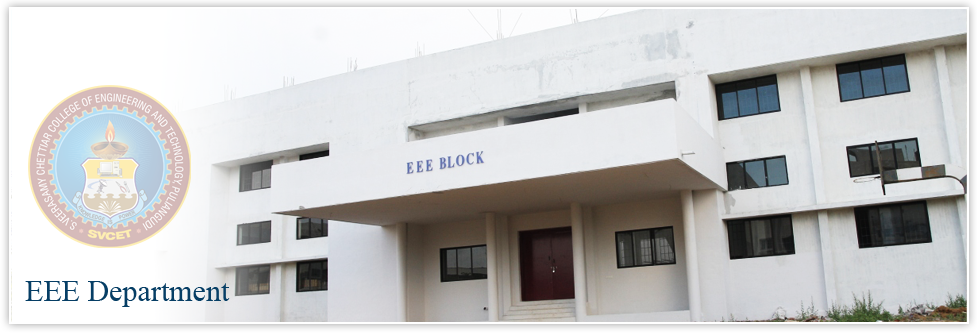
Mission
1. To maintain a collegial, supportive and distinct environment that encourages our students and faculty to achieve to the best of their abilities.
2. To provide students with the fundamental knowledge, interdisciplinary problem solving skills, social awareness and confidence required to excel in their chosen profession.

Vision
To be a centre of excellence in technical education by imparting quality teaching and to make our students technologically superior and ethically strong.

Courses Offered
The Department offers B.E. degree in Electrical and Electronics Engineering
Annual Intake :
60 students
Department of Elecrtical and Electronics Engineering
Year of establishment
Started in the year 2006.
Courses Offered:
B.E. - Electrical and Electronics Engineering (4 years)
The department of Electrical and Electronics Engineering was established in the year 2001 with all modern facilities with the sanctioned intake of 60 students. Since then its excellence in academic and other related activities have played on important role in the grown of the institute. The department is recognized by Anna University. Faculty members of EEE department are involved in research in addition to teaching. The areas of research include Power System Optimization, Restructured Power Systems, Artificial Intelligence applications to power Systems, Renewable Energy Sources and its allied areas.
Programme Educational Objectives:
1. To train the students with core engineering knowledge and software skills to understand, analyze and design electrical and electronics products and solutions for the real time applications.
2. To instill in students professional and ethical attitude, teamwork skills, leadership and multi-disciplinary approach.
3. To build self-confidence to pursue higher studies for carrier development and to prepare the students to succeed in the industry by adapting the contemporary technologies to cater the needs of the industry and society.
Programme Outcomes:
a. Ability to apply knowledge of mathematics, science, and engineering.
b. Ability to design and conduct experiments, as well as to analyze and interpret data.
c. Ability to design a system, component, or process to meet desired needs within realistic constraints such as economic, environmental, social, political, ethical, health and safety, manufacturability, and sustainability.
d. Ability to function on multi-disciplinary teams and to solve contemporary issues.
e. Ability to identify, formulate, and solve engineering problems.
f. Ability to understand professional and ethical responsibility.
g. Ability to communicate effectively.
h. Ability to understand the impact of engineering solutions in a global, economic, environmental, and societal context.
i. Ability to engage in life-long learning.
j. Ability to use the techniques, skills, and modern engineering tools necessary for engineering practice.
k. Knowledge of probability and statistics, including applications to electrical engineering.


